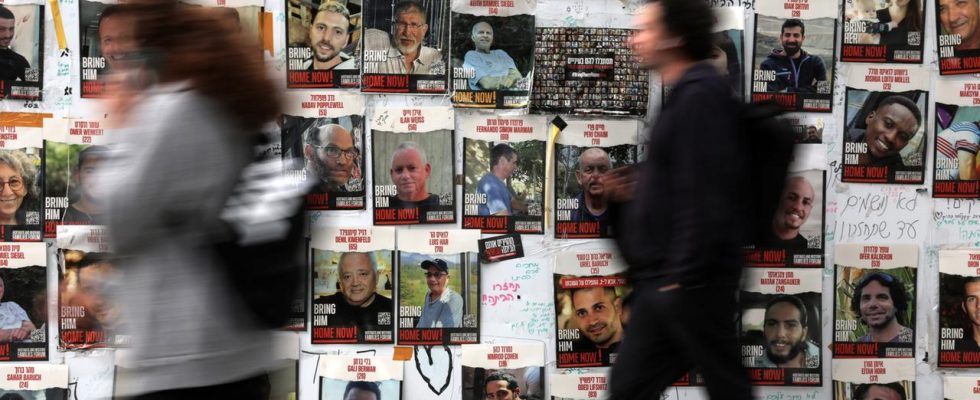In Egypt, representatives of the USA, Israel and Hamas are negotiating a ceasefire and a hostage deal. But there are doubts as to whether Israel is even interested – and whether Qatar is the right mediator
The delegations have traveled to Egypt again and a deal is being negotiated again. William Burns is there, the head of the US secret service CIA, and his Israeli counterpart, Mossad chief David Barnea. Egypt and Qatar are sitting at the negotiating table and Hamas representatives are also said to be in Egypt.
Osama Hamdan, a high representative of the radical Islamist Hamas in Lebanon, has previously called for the destruction of Israel. A few days ago, however, he welcomed the new initiative. “We appreciate the efforts that our brothers in Egypt and Qatar are making to achieve a permanent ceasefire in Gaza and end the ongoing aggression against the Palestinians,” Hamdan said.
Ceasefire only if the hostages are released
It’s about a ceasefire that, from US President Joe Biden’s perspective, should last at least six weeks. Then something permanent should be built, said Biden. But this ceasefire will only come if hostages are released. Around 100 are said to still be in the Gaza Strip, as well as more than 30 hostages who are said to have already died as a result of the fighting.
Hamas is calling for the release of Palestinian prisoners in Israeli prisons; there is talk of 1,500 people. This is also why Zvi Sukkot, a right-wing extremist Jewish settler who sits in the Israeli parliament, rejects a deal with Hamas and also has a problem with one of the mediators.
He doesn’t believe that anything will develop from the talks in Cairo. And he is not alone with this attitude; most members of the government see it the same way. “Especially setting up the Qataris as mediators is problematic. The only way to bring the hostages back is to have your foot on Sinwar’s neck, then he will agree to a deal,” said Sukkot, referring to Hamas leader Jahia Sinwar , who is considered the mastermind of the October 7 massacre. “The Qataris are on the side of evil, there are better mediators,” says Sukkot.
Doubts about Israel’s interest
Israel’s Prime Minister Benjamin Netanyahu recently made similar statements – thereby offending the Qatari mediators. He repeatedly states that only sustained military pressure will lead to complete victory. Because of statements like these, there are doubts as to whether Israel’s government even wants a ceasefire.
The most important question from Israel’s perspective is the hostage issue, says Avi Töpfer, Netanyahu’s party colleague and Agriculture Minister. “This war will not end without the return of all hostages. The next deal will have to be about all hostages, even if that means releasing the hostages in successive phases,” said Töpfer. If not, they would give Hamas some breathing room again. They shouldn’t think they can play games. “Then the war will only become more complicated, more problematic and it will be more difficult to maintain the goals,” fears Töpfer.
Ground offensive expected in Rafah
Israel’s goals also include an offensive in Rafah, the border town in the Gaza Strip with Egypt. Here too, the infrastructure of Hamas and other terrorist organizations is suspected. There are reports of tunnels leading to Egypt, through which weapons are said to have entered the Gaza Strip.
Therefore, Israel’s army must expand its operations in Rafah, said Benny Gantz, who is part of the war cabinet. “There is no doubt that action must be taken wherever there is terror. A broad-based approach in Rafah is also out of the question,” says Gantz. “We are in talks with our friends in the world, especially with Egypt. We will do everything that enables us to act. This includes evacuating the population, securing the borders and preparing for a ground offensive.”
Humanitarian catastrophe feared
The fighting on the outskirts of Rafah is already becoming more intense, and air strikes and shelling of targets in the city have also increased. More than 1.3 million people are said to be staying there. They are seeking protection from the fighting and hope to be able to obtain relief supplies more easily there.
How these people can be brought to safety is still unclear. Israel proposes to build large tent cities in southwest Gaza. It is unclear whether this will ever exist. And until then, many more civilian casualties must be expected. Several countries, including Germany, are expecting a humanitarian catastrophe in Rafah.
Jan-Christoph Kitzler, ARD Tel Aviv, tagesschau, February 13, 2024 12:51 p.m

